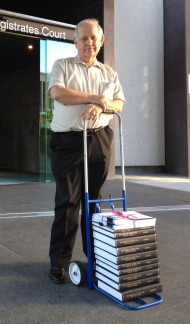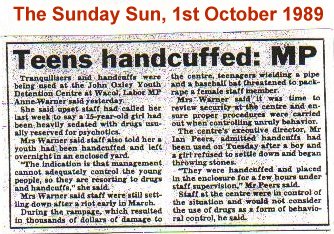A failure to take into proper consideration the facts and law relating to a particular matter; an Arbitrary or unreasonable departure from precedent and settled judicial custom.
Where a trial court must exercise discretion in deciding a question, it must do so in a way that is not clearly against logic and the evidence. An improvident exercise of discretion is an error of law and grounds for reversing a decision on appeal. It does not, however, necessarily amount to bad faith, intentional wrong, or misconduct by the trial judge.
For example, the traditional standard of appellate review for evidence-related questions arising during trial is the "abuse of discretion" standard. Most judicial determinations are made based on evidence introduced at legal proceedings. Evidence may consist of oral testimony, written testimony, videotapes and sound recordings, documentary evidence such as exhibits and business records, and a host of other materials, including voice exemplars, handwriting samples, and blood tests.
Before such materials may be introduced into the record at a legal proceeding, the trial court must determine that they satisfy certain criteria governing the admissibility of evidence. At a minimum, the court must find that the evidence offered is relevant to the legal proceedings. Evidence that bears on a factual or legal issue at stake in a controversy is considered relevant evidence.
The relevancy of evidence is typically measured by its probative value. Evidence is generally deemed Probative if it has a tendency to make the existence of any material fact more or less probable. Evidence that a murder defendant ate spaghetti on the day of the murder might be relevant at trial if spaghetti sauce was found at the murder scene. Otherwise such evidence would probably be deemed irrelevant and could be excluded from trial if opposing counsel made the proper objection.
During many civil and criminal trials, judges rule on hundreds of evidentiary objections lodged by both parties. These rulings are normally snap judgments made in the heat of battle. Courts must make these decisions quickly to keep the proceedings moving on schedule. For this reason, judges are given wide latitude in making evidentiary rulings and will not be over-turned on appeal unless the appellate court finds that the trial judge abused his or her discretion.
For example, in a Negligence case, a state appellate court ruled that the trial court did not abuse its discretion by admitting into evidence a posed accident-scene photograph, even though the photograph depicted a model pedestrian blindly walking into the path of the driver's vehicle with the pedestrian's head pointed straight ahead as if she was totally oblivious to the vehicle and other traffic. Gorman v. Hunt, 19 S.W.3d 662 (Ky. 2000). In upholding the trial court's decision to admit the evidence, the appellate court observed that the photograph was only used to show the pedestrian's position relative to the vehicle at the time of impact and not to blame the pedestrian for being negligent. The appellate court also noted that the lawyer objecting to the photograph's admissibility was free to remind the jury of its limited relevance during cross-examination and closing arguments.
An appellate court would find that a trial court abused its discretion, however, if it admitted into evidence a photograph without proof that it was authentic. Apter v. Ross, 781 N.E.2d 744 (Ind.App. 2003). A photograph's authenticity may be established by a witness's personal observations that the photograph accurately depicts what it purports to depict at the time the photograph was taken. Ordinarily the photographer who took the picture is in the best position to provide such testimony.
Further readings
Cohen, Ruth Bryna. 2000."Superior Court Affirms Non Pros for Failure to Subpoena Own Witness; Trial Court Did not Abuse Discretion in Its Application of Civil Procedure Rule 216." Pennsylvania Law Weekly (October 9).
Hamblett, Mark. 2001. "Circuit Panel Issues Recusal Guidelines; Says Rakoff Acted Properly In Not Stepping Down." New York Law Journal (February 26).
Riccardi, Michael A. 2002."Polygraph Evidence OK to Prove Probable Cause, Circuit Judges Say; No Abuse of Discretion in Relying on 'Lie Detector' for Limited Purpose." Pennsylvania Law Weekly (April 29).
Cross-references
West's Encyclopedia of American Law, edition 2. Copyright 2008 The Gale Group, Inc. All rights reserved.
Ads by Google
Defamation Lawyer
Experienced Defamation Specialists 28 years experience in defamation
australian-defamation-lawyers.com.au
Experienced Defamation Specialists 28 years experience in defamation
australian-defamation-lawyers.com.au







